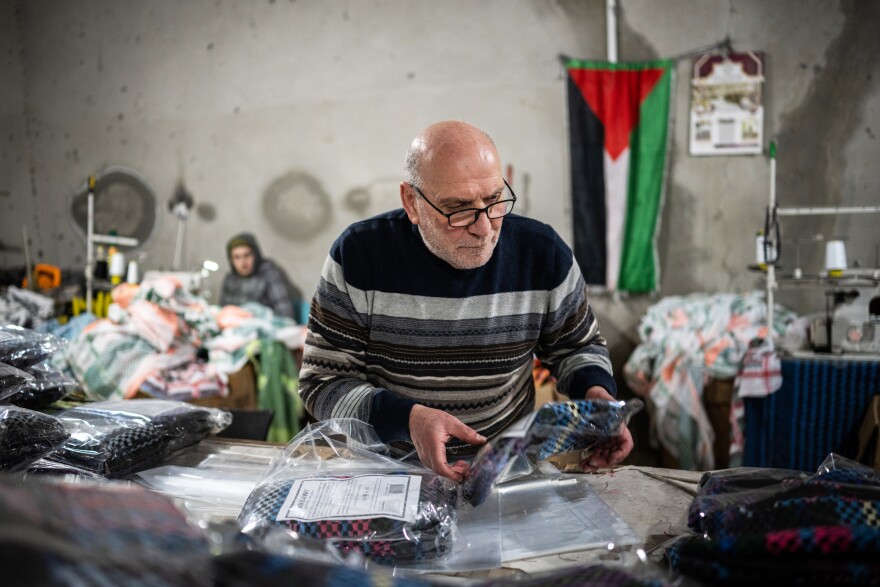Updated February 29, 2024 at 2:08 PM ET
As protests supporting Palestinian civilians in Gaza erupted in big cities across the country last year, Katie Della Terza's small town in northwest New Jersey remained quiet.
Still, the 34-year-old environmental health specialist wanted to find a way to show her support for Palestinians amid Israel's offensive in Gaza — as horrifying pictures and videos of women and children being killed there started to flood her Instagram feed.
That's when she came across the Instagram account for the Hirbawi keffiyeh factory. Located some 6,000 miles away from New Jersey, in a small factory just off a busy street in the West Bank city of Hebron, 15 old-school mechanical looms whir day in and day out.
The machines are producing keffiyehs — or kufiyas, as the factory spells it — traditional scarves closely associated with Palestinian history and resistance. So people like Della Terza are buying up the factory's stock as a show of support for Gaza, where officials say Israel's military offensive has killed more than 30,000 Palestinians.
About a month after she hit the purchase button, a white scarf with green zigzag embroidery showed up at her door. Now, she wears it regularly for errands and work.
"I don't have a big platform or anything like that, but whatever I can do, I'm trying to do it," Della Terza said. "That's posting on social media, that's wearing the keffiyeh."


Keffiyehs became well-known as a symbol of Palestinian nationalism during the last century. Traditionally, Palestinian keffiyehs are black and white, but the Hirbawi factory makes them in many colors. Palestinian leader Yasser Arafat was rarely seen without one, and many of his keffiyehs were made at the same factory where Della Terza bought her scarf. Today, keffiyehs are a common sight at pro-Palestinian protests around the world. For many people, they represent support for Palestinians facing Israeli occupation or displacement.
The Hirbawi family says their factory is the only one in the West Bank that makes keffiyehs, and that most others are mass produced in China. This singularity has caused their sales to soar in recent months, even as the rest of the economy in the West Bank has taken a hit after the Oct. 7 Hamas-led attacks in Israel that killed around 1,200 people.
The family-owned business now has almost 300,000 followers on Instagram. Many of them, like Della Terza, say they purchased from the factory to show support for Palestinians amid the ongoing conflict in Gaza.
In fact, business spiked so quickly after Oct. 7th that Judeh Hirbawi, who operates the business with two of his brothers, mentioned that all their machines are running, and their merchandise is now on backorder. In an interview with NPR at his home in Hebron, he says that sales have surged by 50 to 70 percent.


"Usually, we have leftovers, usually we have stuff that's always stored," Hirbawi said. "We don't have one keffiyeh in storage."
Just outside Hirbawi's apartment, Murad sits in a parked car in front of the Hirbawi factory store. He's one of many people trying to get his hands on a Hirbawi keffiyeh. Murad didn't want to give his full name because he fears speaking publicly could make him a target of harassment by the Israeli military.
He's been trying for a month to make this purchase, but the factory has had so many orders recently that he hadn't been able to get them yet.
Murad works for a nonprofit that advocates for nonviolent resistance to Jewish settlements in the Israeli-occupied West Bank. He plans to ship 100 scarves to friends in Europe who have been requesting keffiyehs from the factory.
"It's new conditions for the Palestinians," Murad said. "Now the world is changing to support the basic rights of the Palestinians, so they are proud to get our keffiyehs."

But even as he waits to buy dozens of the scarves, Murad doesn't wear a keffiyeh himself. He lives in Hebron, a city where Palestinians and Jewish settlers live in close quarters, with tensions running high. He believes that wearing a keffiyeh in public raises the risk of being targeted by the many Israeli soldiers who patrol the area.
"They are not only fighting us," Murad said. "They are fighting our history, our land, our traditional food — everything."
Mark Katkov edited the audio version, and Majd Al-Waheidi edited it for digital. contributed to this story
Copyright 2024 NPR. To see more, visit https://www.npr.org.



